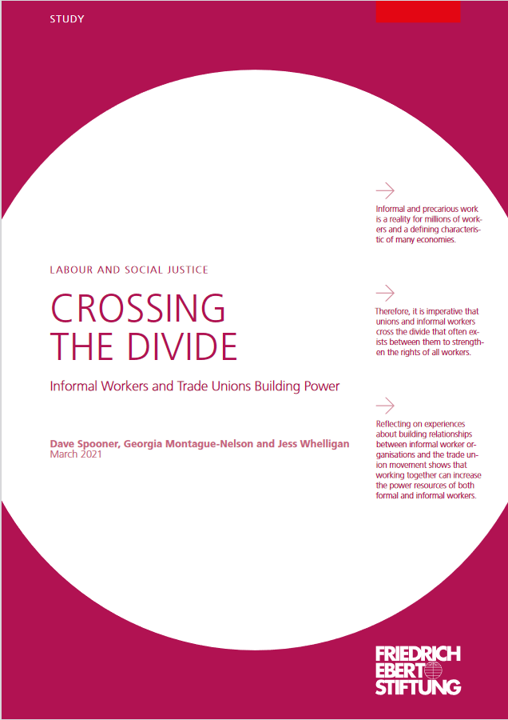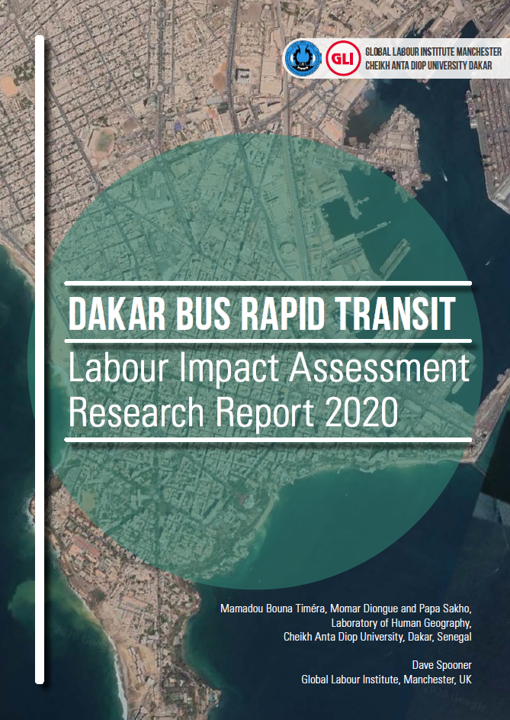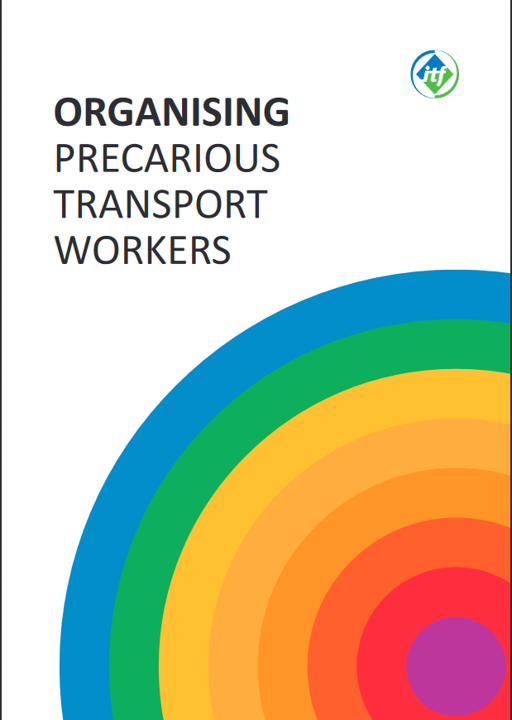GLI offers trade unions and support organisations specialist expertise and experience in research and publications, working closely with national and international research networks of supportive academics, and trade union research institutions. GLI also undertakes independent evaluations of projects and programmes supporting workers’ organisations, labour education and trade union capacity development.
In particular, GLI specialises in:
Toolkit on Taking Action on Violence & Harassment Against LGBTQI+ Workers & other Vulnerable Groups (2024)
A facilitator guide and participant workbook to provide unions with the tools to develop action to tackle violence and harassment against LGBTQI+ workers and other vulnerable groups in the world of work.
Commissioned by a coalition of Global Union Federations.
Click here to read the facilitator guide.
Click here to read the participant workbook.
A report highlighting good practices and providing guidance and recommendations on how to include a just transition in social dialogue and collective bargaining, with a specific focus on International Framework Agreements (IFAs). It aims to contribute to strengthen workers and trade unions’ agency on climate change issues. This report was commissioned by the Building and Wood Workers’ International (BWI) with the support of the Laudes Foundation. Click here to read this report in English. An assessment of the potential impact of the World Bank-financed Urban Mobility Project, including the introduction of Bus Rapid Transit (BRT) on the workforce of Dakar’s gbaka and woro-woro informal transport industry and a contribution towards the active engagement of transport workers’ representatives in shaping a modern, accessible, efficient and environmentally sustainable transport system for the city. The project was commissioned by the International Transportworkers Federation (ITF). Click here to read this report in English. Click here to read this report in French. A description of the informal transport workforce in Accra, including those working in the trotro minibus, taxi and okada (motorcycle taxi) industries. It examines workforce characteristics, livelihoods and employment relationships, provides in-depth economic profiles of operations, identifies key issues, and considers options for formalisation. The report is based on research undertaken by GLI in 2021 in partnership with the University of Cape Coast and transport trade unions in Ghana, as part of a broader project with Transitec Consulting Engineers and Organisation Development Africa (ODA), commissioned by the Ghana Urban Mobility and Accessibility Project (GUMAP) of the Ministry of Local Government and Rural Development. Click here to read the report. This research study on the impact of the COVID-19 pandemic on women transport workers was produced for the International Transportworkers Federation (ITF). The study aims to explore the impact that the COVID-19 pandemic has had on women transport workers, including in increasing exposure to violence and harassment, and to assess the long-term impact of the crisis on women. It also identified several recommendations for how trade unions can work with governments and employers to address the impacts of the pandemic on women transport workers, and to integrate this into the COVID-19 response and recovery. Click here to read the research report in English. This guide on ‘rebuilding the social organisation of care’ was produced for Public Services International (PSI) to assist trade unions and women workers around the world to make PSI’s Care Manifesto an instrument of trade union political action at the local level to rebuild the social organisation of care for a new model that puts caring for people over caring for profit. It includes an Advocacy Guide and an Activity Workbook. Click here to read the Advocacy Guide in English. Click here to read the Advocacy Guide in Spanish. Click here to read the Activity Workbook in English. Click here to read the Activity Workbook in Spanish. The guide is also available as a digital publication. Click here to access the digital publication. This book on the history of the international trade union movement was produced as part of the GLI History Project. Supported by the Friedrich Ebert Stiftung (FES), the book is designed to introduce activists who are new to the international movement, and those active in local and national trade unions, to current important issues and debates within the international labour movement, and their long histories. Click here to read and download the book in English. This ‘Gender Equality Guide for Trade Unionists’ was produced for the International Union of Foodworkers (IUF) and it intends to foster equality by promoting solidarity, building union strength and tackling the inequality issues that women face. It is divided into two sections: Section 1: Fighting Inequality highlights gender equality issues on which we should work together to tackle. Section 2: Union Power for All introduces organising strategies which can: It is based on a previous guide that the IUF published in 2007 – ‘All for One = One for All’. This new guide is updated and extended with new chapters and stories. Click here to read the guide in English, French and Spanish. This guide on tackling the climate crisis in intensive livestock production was produced for the International Union of Foodworkers (IUF) to equip unions representing workers in the meat and dairy sectors to influence the conditions for a just transition, and to propose the necessary transformative solutions to tackle the climate crisis. It includes a guide on the climate crisis and an activity workbook. Click here to read the guide in English, German, Portuguese, and Spanish. The guide will also soon be made available in French and Swedish. This chapter on ‘Women in Public Transport’ was written for the International Transportworkers Federation (ITF) to inform policy proposals on gender equality for the ITF People’s Public Transport Policy, as part of the Our Public Transport programme. Click here to read the chapter. 10 years since the adoption of ILO Convention 189 on Decent Work for Domestic Workers, this new booklet celebrates the progress that has been made for domestic workers in Europe. It highlights EFFAT’s achievements in giving recognition to domestic workers through solid trade union representation and a political commitment at the European level, and looks at future plans to strengthen recognition and representation further. This booklet was commissioned by the European Federation of Food, Agriculture and Tourism Trade Unions (EFFAT). Click here to read the booklet. A Train the Trainers Toolkit on the ILO Violence and Harassment Convention (No. 190) and Recommendation (No. 206). The toolkit aims to provide unions with tools to develop workplace solutions that tackle violence and harassment, with a special focus on gender-based violence and harassment, and ensure that violence is no longer considered as “part of the job”. The toolkit includes both a facilitator guide and an activity workbook. Click here to read the toolkit in English, French and Spanish. Click here to read the activity workbook in English, French and Spanish. This toolkit was commissioned by a coalition of Global Union Federations (IUF, PSI, ITUC, ITF, EI, IFJ, IndustriALL, IDWF, UNI Global Union, and BWI) as a resource for the international trade union movement. A booklet produced for the International Domestic Workers Federation (IDWF) and Women in Informal Employment: Globalizing and Organizing (WIEGO) in commemoration of the 10th anniversary of C189. This booklet celebrates the progress made for domestic workers since the adoption of ILO C189, and looks to the challenges that still lie ahead. Click here to read this booklet. A paper produced for the for the Friedrich-Ebert-Stiftung (FES) as a follow-up to the Trade Unions in Transformation project of the FES Global Trade Union Programme. The paper reflects experiences and policies from examples of organisations across the spectrum of those with an interest in relationships between informal worker organisations and the trade union movement. Click here to read this paper in English. Click here to read this paper in French. A guide for trade unions and associations of informal transport workers on the impact of the pandemic on informal passenger transport workers, the response of transport authorities and the urgent need for reform towards inclusive formalisation. The guide was commissioned by the ITF. Click here to read this guide. An assessment of the potential impact of the introduction of Bus Rapid Transit (BRT) on the workforce of Dakar’s informal transport industry and a contribution towards the active engagement of transport workers’ representatives in shaping a modern, accessible, efficient and environmentally sustainable transport system for the city. The project was commissioned by the ITF and undertaken in partnership with the Laboratoire de Géographie Humaine at the University of Dakar (UCAD), and Women in Informal Employment: Globalizing & Organizing (WIEGO). Click here to read this report in English. Click here to read this report in French. This report attempts to provide a detailed assessment of the market struture of the paratransit industry in Kampala, including both minibus (“taxi”) and motorcycle taxi (“boda-boda”) services. It is intended to contribute towards an understanding of how paratransit services can be incrementally improved and professionalised to minimize some of its negative effects on Kampala’s overall transport system, and how to integrate the existing informal service into the proposed new Bus Rapid Transit (BRT) system. Click here to read this report. This guide attempts to develop policy options for transport unions to consider when planning negotiations with agencies on the introduction of BRT and formalisation of the informal transport industry. It is primarily designed for ITF affiliated transport unions in Africa and Asia where BRT is rapidly expanding, but is hopefully of value to all trade unions organising in urban transport. Click here to read this report in English. Click here to read this report in French. Click here to read this report in Spanish. This report assesses the potential impact of the introduction of Bus Rapid Transit on the workforce of Nairobi’s informal transport (‘matatu’) industry, and seeks to encourage the active engagement of matatu workers’ representatives in shaping a modern, accessible, efficient and environmentally sustainable transport system for the city. Click here to read this report. Click here to read this report. Using mix methods for collecting data and information, this evaluation reviewed the ILO’s interventions with the intention of delivering capacity development in its constituents covering the period 2010-2017. Click here to read this evaluation. A Case Study of the Amalgamated Transport & General Workers Union (ATGWU) in Uganda which pioneered the successful organisation of more than 100,000 informal transport workers through the formation of alliances with informal workers’ associations. The project was commissioned by the Friedrich Ebert Stiftung as a contribution to its Trade Unions in Transformation project and undertaken by GLI in partnership with ATGWU. Click here to read this case study. In 2016 GLI Manchester released our new short film, “The Power of Informal Transport Workers” This film shows how informal transport workers across the world are organising in trade unions to fight back against precarious and dangerous working conditions. Produced as part of the ITF Informal Transport Workers Project, the film brings together interviews with union activists from seven different countries who talk about the challenges that informal workers face and the ways in which their unions are building informal worker power. Click here to watch this film. The evaluation examined the efficiency, effectiveness, relevance, impact and sustainability of two projects focused on building strong, independent and representative organisations. Click here to read this evaluation. This evaluation examined the efficiency, effectiveness, relevance, impact and sustainability of a project focused on developing the capacity of workers’ organizations in the Arab region. Click here to read this evaluation. This precarious transport workers booklet was prepared for the International Transportworkers’ Federation based on quotes and examples from the ITF’s survey on Informal and precarious work. Click here to read this booklet. Design and management of research and education in Africa, Asia and Latin America to support the democratic organisation and representation of informal transport workers. The project was a partnership with ITF and FNV Mondiaal, the international development organisation of the Dutch FNV trade union confederation. Click here to read this booklet. Click here to read this report. Click here to read this booklet. Click here to read this manual. Click here to read this research. This research and training was commissioned by Realizing Rights/Rockefeller Foundation as part of the project Taking Stock: Decent Work Opportunities for Women and Men in the Informal Economy. Click here to read this report.
BWI: Social Dialogue and Collective Bargaining in the Green Transition (2023)
Abidjan Bus Rapid Transit and Metro – Labour Impact Assessment Research Report (2023)
Informal Transport Workers in Accra (2023)
Livelihoods, Organisation and Issues
ITF Study on the Impact of COVID-19 on Women Transport Workers (2022)
Rebuilding the Social Organisation of Care – An Advocacy Guide and Activity Workbook (2022)
The Story of Our International Labour Movement (2022)
All for One = One for All: A Gender Equality Guide for Trade Unionists in IUF Sectors (2022)
Fighting for our Future: An IUF Guide on Tackling the Climate Crisis in Intensive Livestock Production (2022)
ITF People’s Public Transport Policy – Women in Public Transport (2021)
Domestic Workers in Europe: Getting the Recognition they Deserve (2021)
Global Union Toolkit on ILO C190 and R206 (2021)
Ten Years Since Winning C189: Domestic Workers Become an Unstoppable Movement (2021)
Crossing the Divide: Informal Workers and Trade Unions Building Power (2021)
Informal Passenger Transport Beyond COVID-19: A Trade Union Guide to Worker-Led Formalisation (2020)
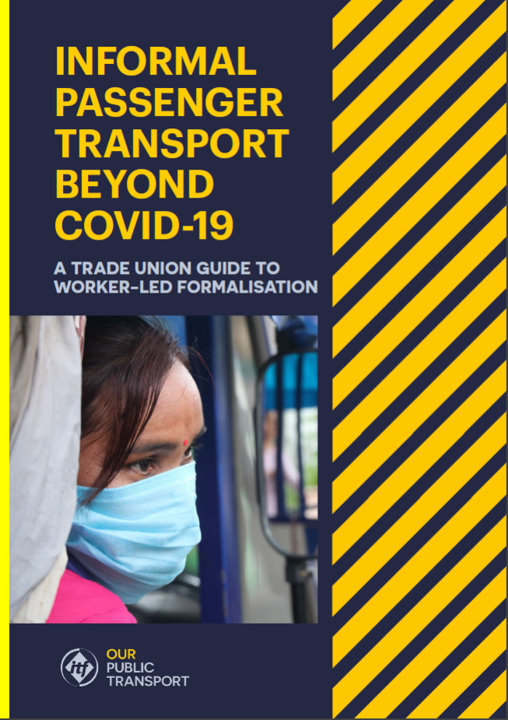
Dakar Bus Rapid Transit: Labour Impact Assessment (2020)
Kampala Bus Rapid Transit Report: Understanding Kampala’s Paratransit Market Structure (2020)
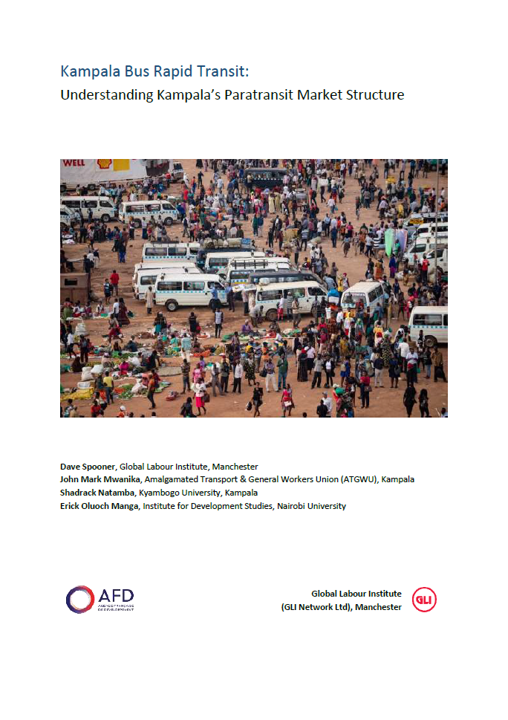 The research and subsequent report were undertaken through a contract with Agence Française de Développement (AFD) to support the Government of Uganda and the Kampala Capital City Authority in preparation of the planned introduction of Bus Rapid Transit (BRT) in Kampala.
The research and subsequent report were undertaken through a contract with Agence Française de Développement (AFD) to support the Government of Uganda and the Kampala Capital City Authority in preparation of the planned introduction of Bus Rapid Transit (BRT) in Kampala.
Bus Rapid Transit (BRT) and the Formalisation of Informal Public Transport – A Trade Union Negotiating Guide (2020)
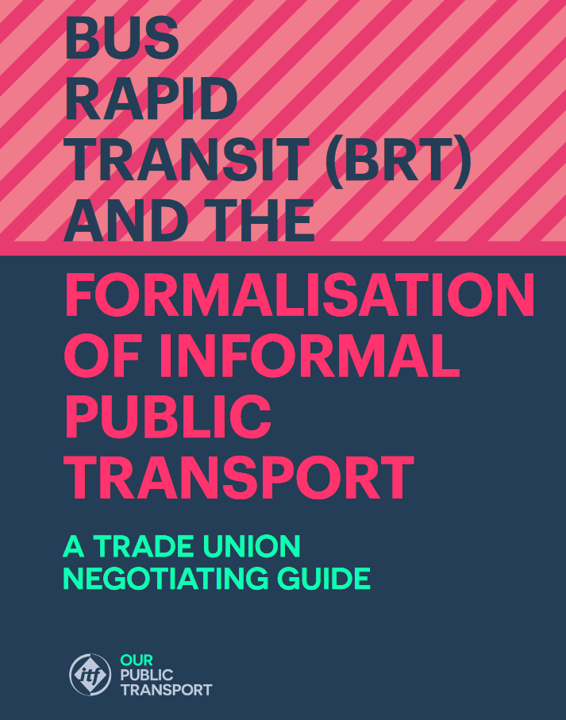 This negotating guide was commissioned for GLI Manchester by the International Transport Workers Federation (ITF) as a contribution to the ITF Our Public Transport (OPT) programme.
This negotating guide was commissioned for GLI Manchester by the International Transport Workers Federation (ITF) as a contribution to the ITF Our Public Transport (OPT) programme.
Nairobi Bus Rapid Transit Labour Impact Assessment Research Report (2019)
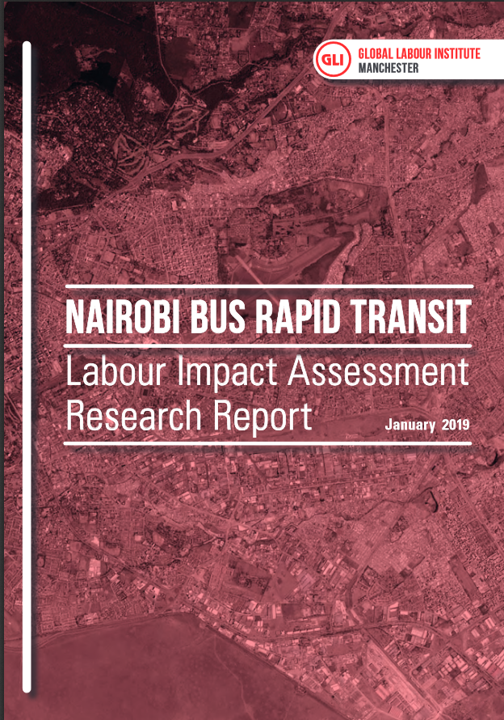 This full report of research was commissioned for GLI Manchester by the International Transport Workers Federation (ITF) as a contribution to the ITF Our Public Transport (OPT) programme.
This full report of research was commissioned for GLI Manchester by the International Transport Workers Federation (ITF) as a contribution to the ITF Our Public Transport (OPT) programme.
Nairobi Bus Rapid Transit Labour Impact Assessment (2018)
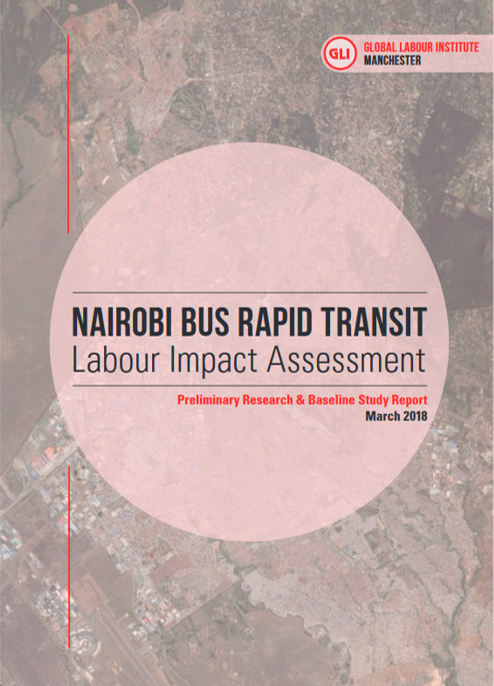 The GLI was commissioned by the International Transport Workers Federation (ITF) to undertake preliminary research and write a baseline study report to assess the likely impact and implications of Bus Rapid Transit for workers in Nairobi.
The GLI was commissioned by the International Transport Workers Federation (ITF) to undertake preliminary research and write a baseline study report to assess the likely impact and implications of Bus Rapid Transit for workers in Nairobi.

Independent Evaluation: ILO’s Capacity Development Activities, 2010-2017 (2018)
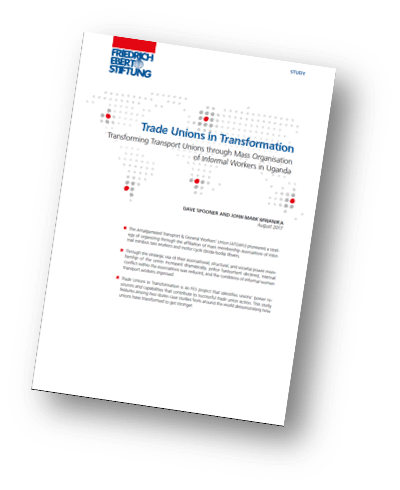 Transforming Transport Unions through the Mass Organisation of Informal Workers (2016-2017)
Transforming Transport Unions through the Mass Organisation of Informal Workers (2016-2017)
FILM: The Power of Informal Transport Workers
 ILO: Strengthening International Labour Standards In Global Supply Chains and Export Processing Zones SCs & EPZs (2016)
ILO: Strengthening International Labour Standards In Global Supply Chains and Export Processing Zones SCs & EPZs (2016)
 ILO: Strengthening of Workers’ Organisations in the Arab Countries through Economic, Social and Legal Literacy (2015)
ILO: Strengthening of Workers’ Organisations in the Arab Countries through Economic, Social and Legal Literacy (2015)
Organising Precarious Transport Workers (2013)
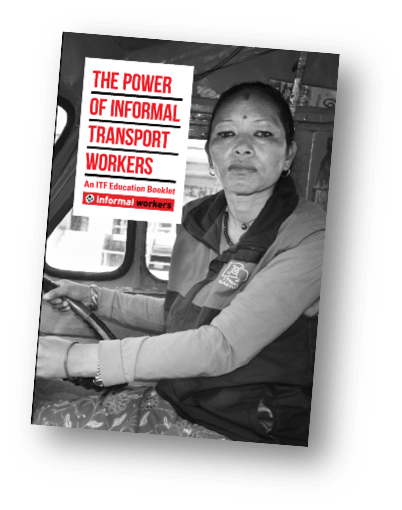 ITF Informal Transport Workers’ Project (2013-2016)
ITF Informal Transport Workers’ Project (2013-2016)
ITF Baseline Survey Report: Precarious Labour and Decent Work in the Transport Industry (2013)
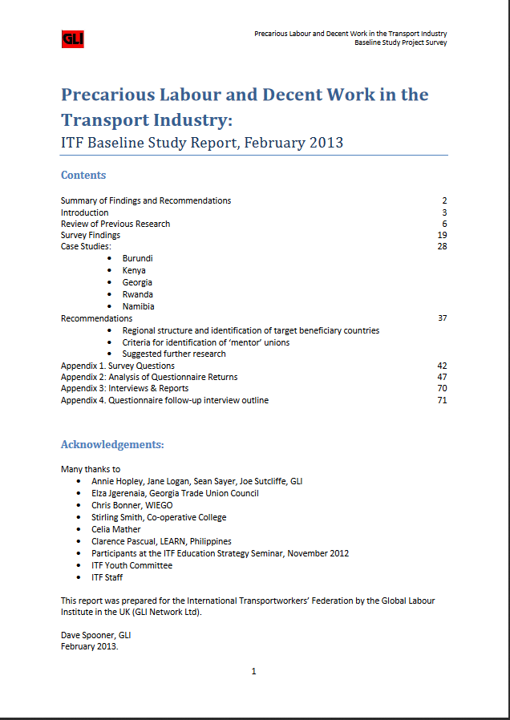 This research and publication was comissioned by the International Transportworkers’ Federation. Its goal was to improve knowledge of the extent, nature and trends in precarious and informal employment in the major transport sectors, and to identify the experience of union organisation, representation and collective bargaining among precarious and informal workers. This report brings together findings from 51 unions in 38 countries.
This research and publication was comissioned by the International Transportworkers’ Federation. Its goal was to improve knowledge of the extent, nature and trends in precarious and informal employment in the major transport sectors, and to identify the experience of union organisation, representation and collective bargaining among precarious and informal workers. This report brings together findings from 51 unions in 38 countries.
The Only School We Have: Learning From Organizing Experiences Across the Informal Economy (2012)
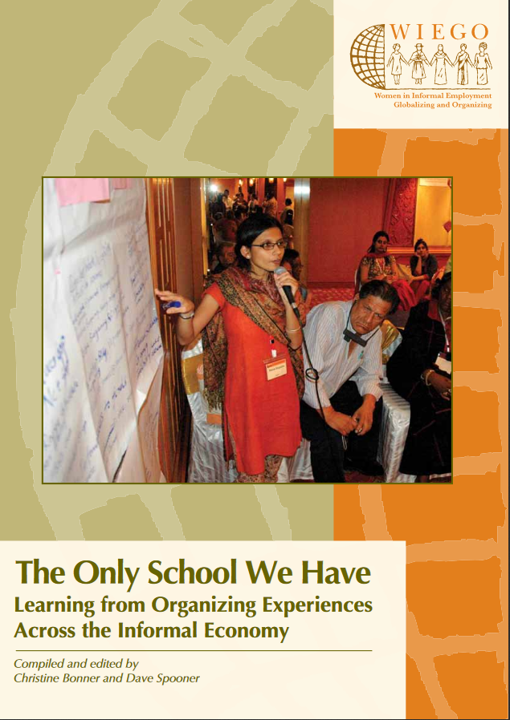 Compiled and edited by Christine Bonner and Dave Spooner, published by Women in Informal Employment: Globalizing and Organizing (WIEGO).
Compiled and edited by Christine Bonner and Dave Spooner, published by Women in Informal Employment: Globalizing and Organizing (WIEGO).
Promoting the ILO Home Work Convention (C177) and the Rights of Homeworkers (2012)
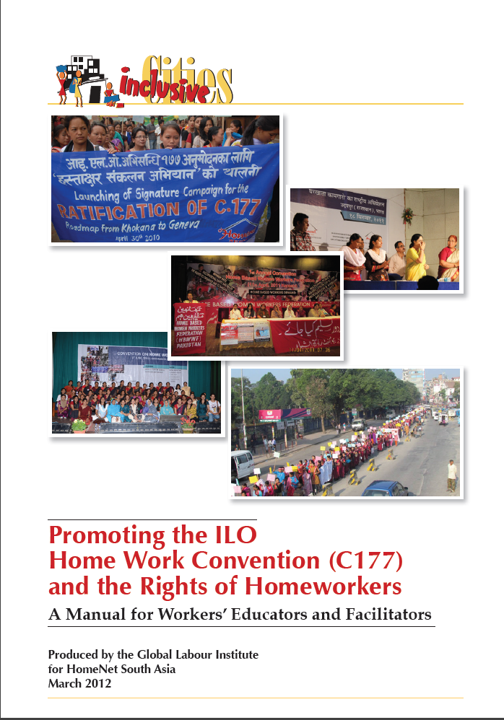 This manual was produced by the Global Labour Institute for HomeNet South Asia. It is a manual for workers’ educators and faciliators to provoke and encourage discussion about homeworkers and their rights as workers and encourage homeworkers and their supporters to get the ILO Home Work Convention put into national law in their own country.
This manual was produced by the Global Labour Institute for HomeNet South Asia. It is a manual for workers’ educators and faciliators to provoke and encourage discussion about homeworkers and their rights as workers and encourage homeworkers and their supporters to get the ILO Home Work Convention put into national law in their own country.
Transport Workers in the Urban Informal Economy: Livelihood Profile (2011)
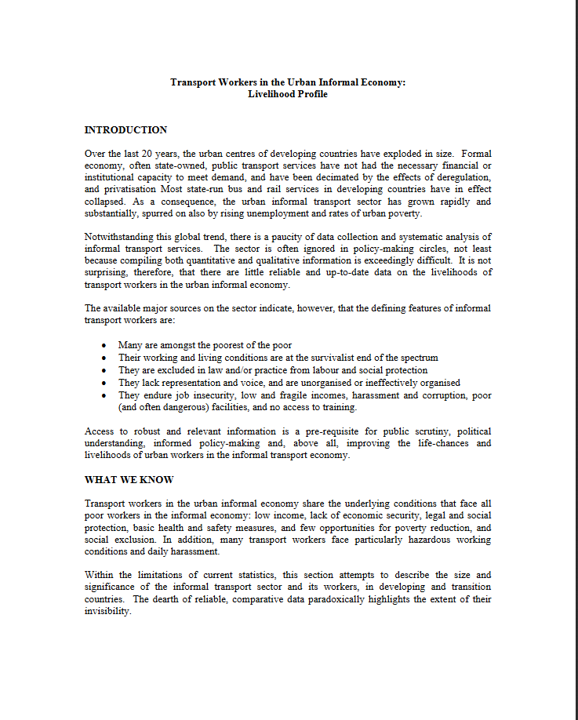 This research was was commissioned by the Bill and Melinda Gates Foundation to profile the size and significance of those working in the urban informal transport sector in developing and transition countries, and to make suggestions on what can be done to improve the life-chances and livelihoods of urban workers in the informal transport economy.
This research was was commissioned by the Bill and Melinda Gates Foundation to profile the size and significance of those working in the urban informal transport sector in developing and transition countries, and to make suggestions on what can be done to improve the life-chances and livelihoods of urban workers in the informal transport economy.
Taking Stock: Decent Work Opportunities for Women and Men in the Informal Economy (2011)
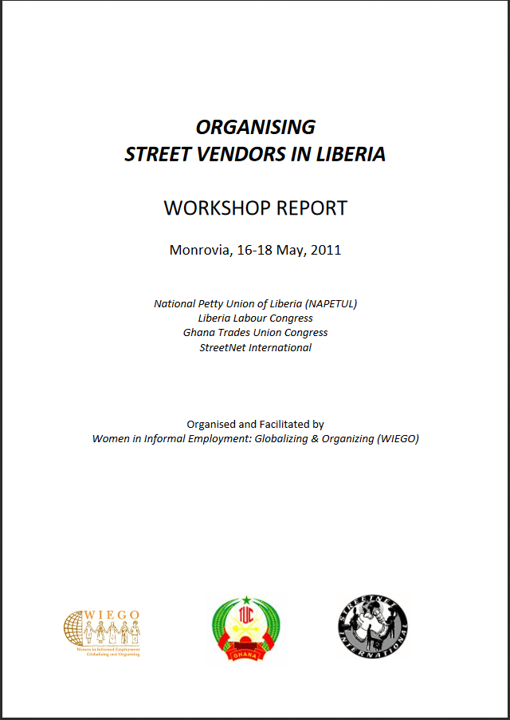 Report of workshop on Organising Street Vendors in Liberia, held in Monrovia in May 2011. This workshop was organised and faciliated by Women In Informal Employment: Globalizing and Organizing (WIEGO) with two closely related aims:
Report of workshop on Organising Street Vendors in Liberia, held in Monrovia in May 2011. This workshop was organised and faciliated by Women In Informal Employment: Globalizing and Organizing (WIEGO) with two closely related aims:

